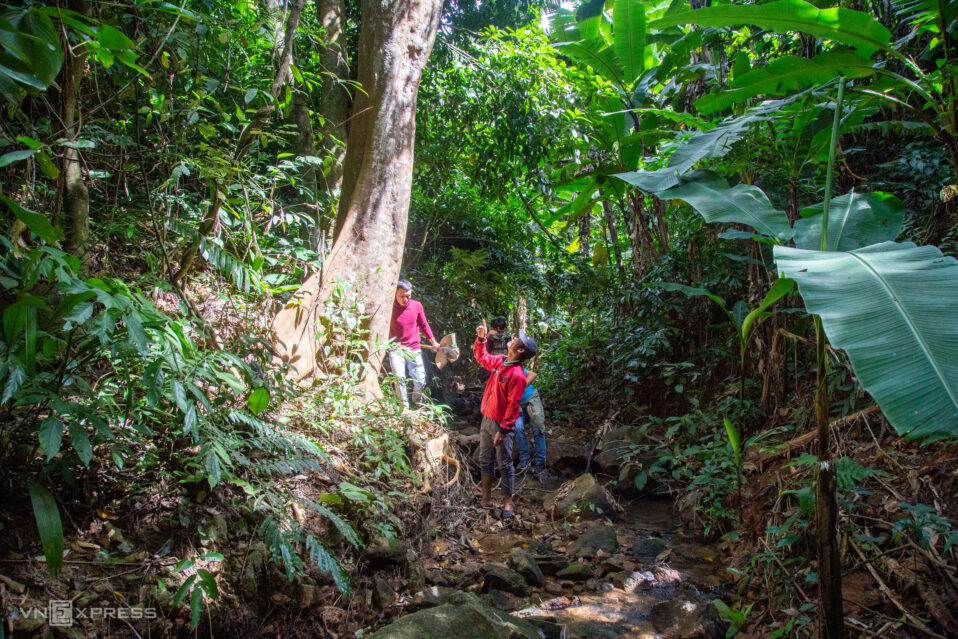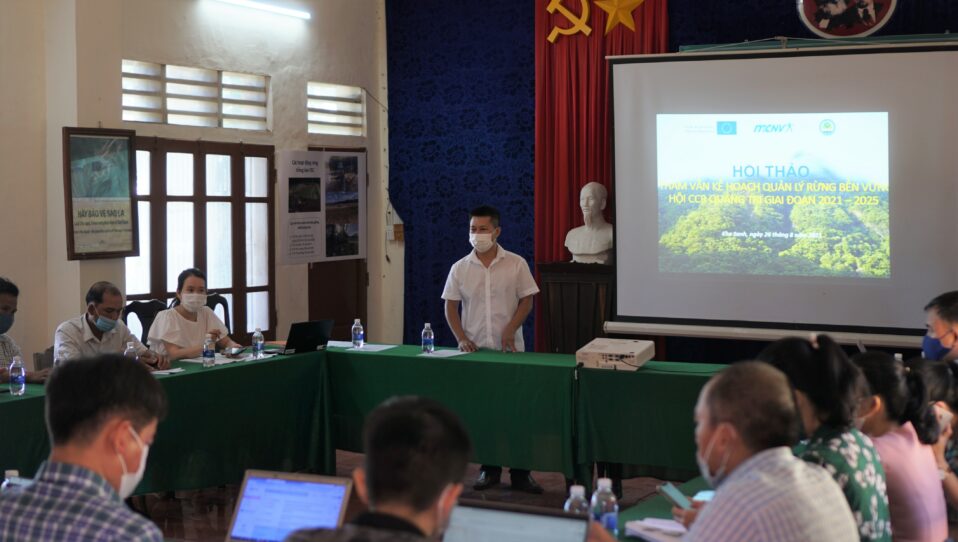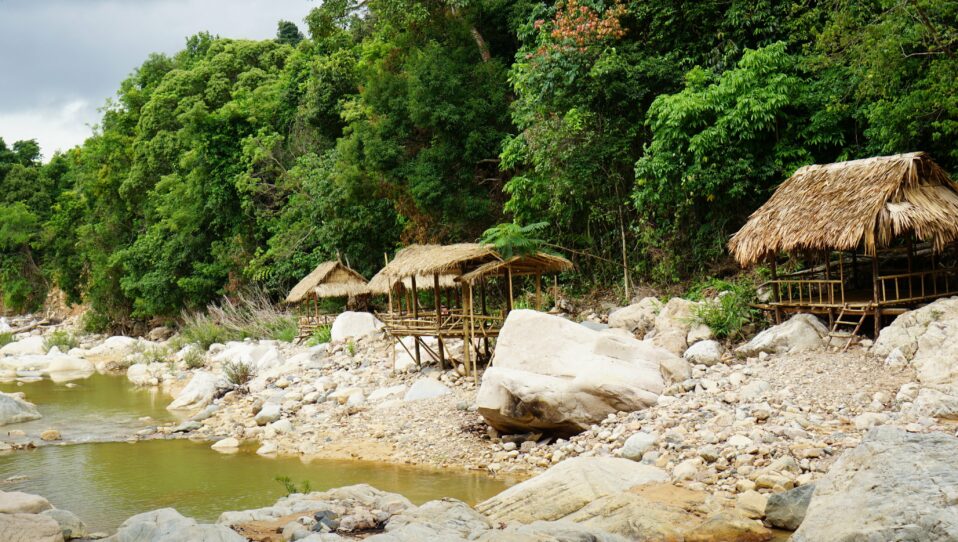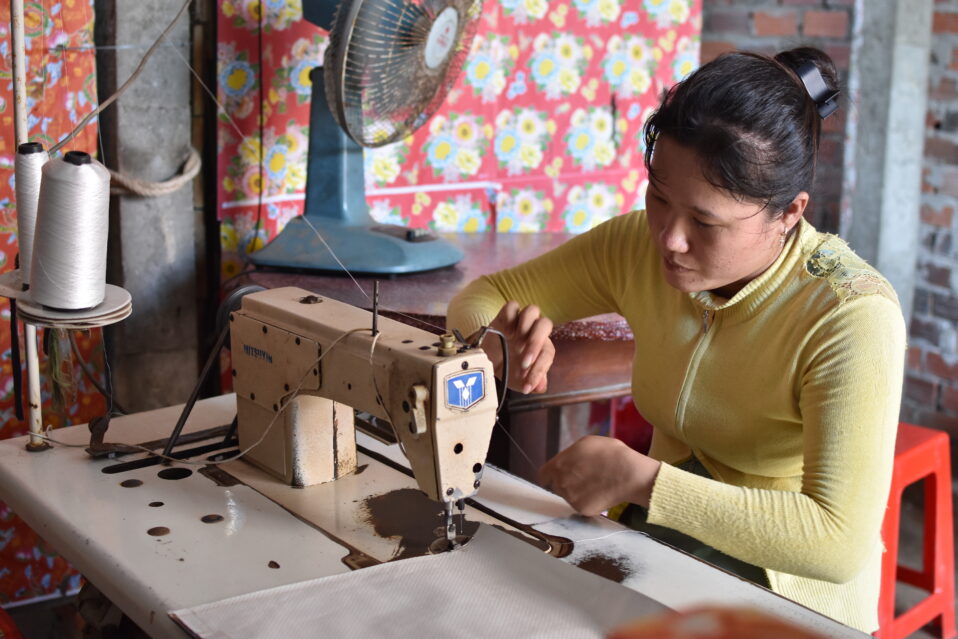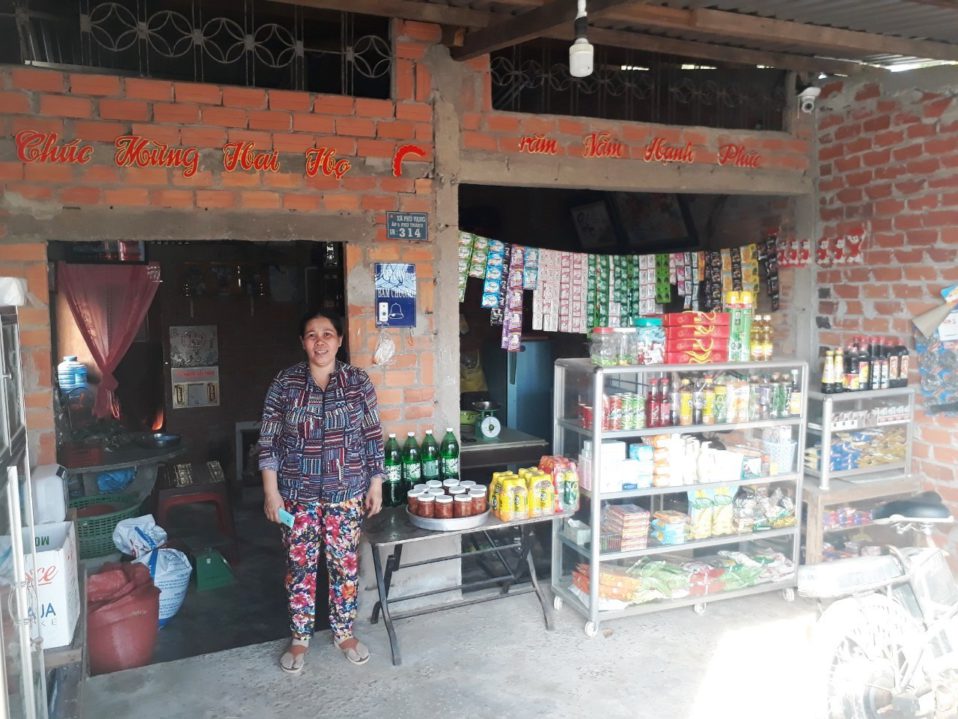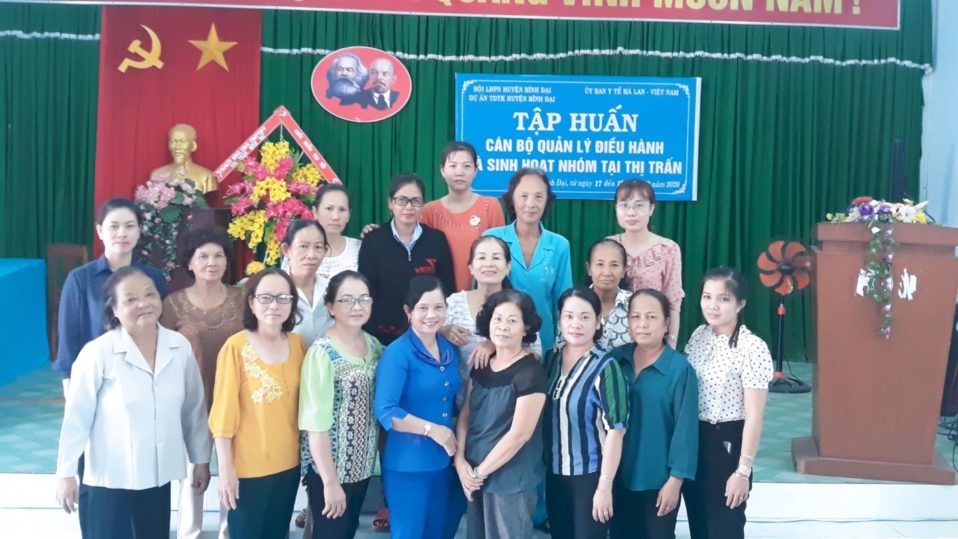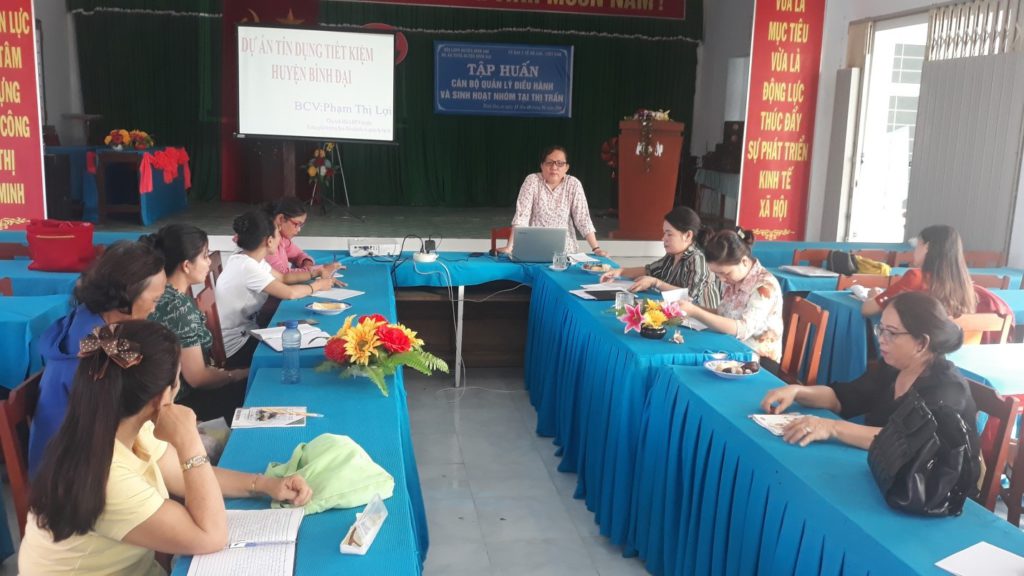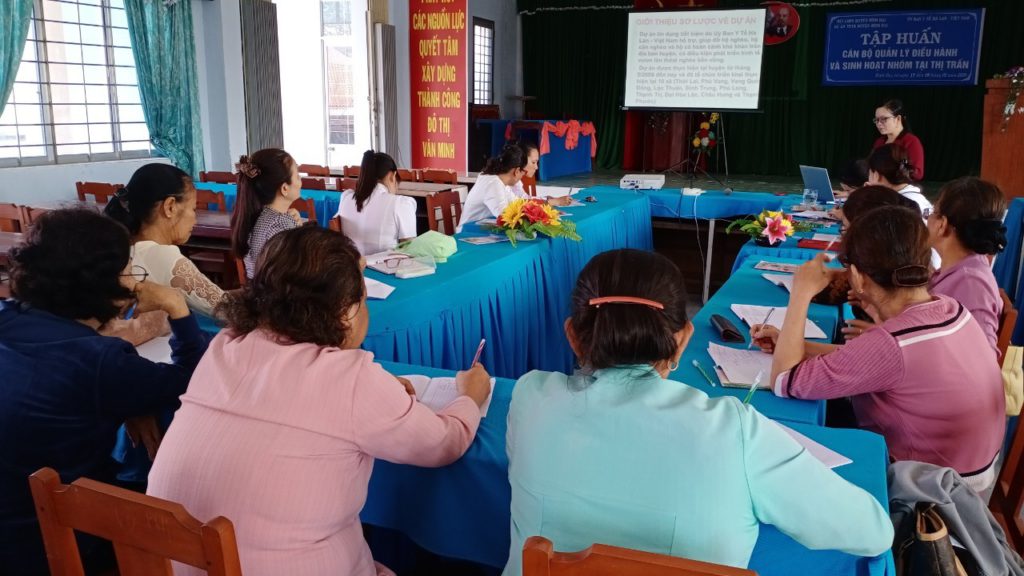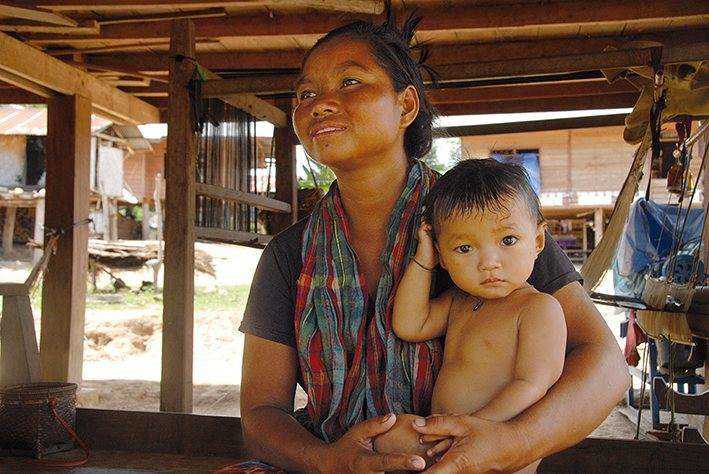PROSPER featured on Vietnam’s most read online news – Vnexpress:
Consultation workshop on sustainable forest management plan period 2021-2025
On August 26th 2021, MCNV collaborated with the Quang Tri Association of Smallholder Forest Certification Groups (SFCG Association) to organize a consultation workshop on the sustainable forest management plan of the SFCG Association for the period of 2021-2025 and the preparation for the FSC® audit of the community-managed natural forests in Chenh Venh village (Huong Phung commune) and Ho village (Huong Son commune), Huong Hoa district.
The workshop was conducted within the project “Promoting sustainable partnership between CSOs and enterprises for sustainable forest management in the context of climate change” (PROSPER) co- funded by the European Union and MCNV.
Various stakeholders of the project were present the workshop, including delegates from Huong Hoa district Forest Protection Department, Department of Agriculture and Rural Development, Huong Hoa – Dakrong Protection Forest Management Board, Northern Huong Hoa Nature Reserve Management Board, Forest Science Center for Northern Central Vietnam, Community Forest Management Board of Ho Village and Chenh Venh Village, Chan May Cooperative, etc.
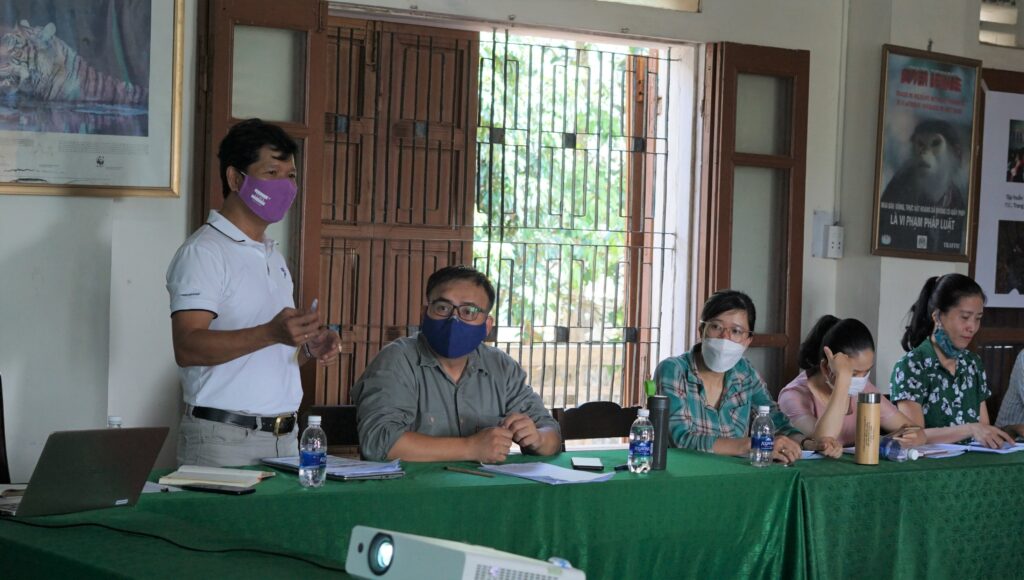
2021 is an important year for Quang Tri SFCG Association as the Association will be audited for FSC® certification for the period 2021-2025. To meet with FSC® audit requirements, with the support from MCNV, Quang Tri SFCG Association has actively assisted 37 member sub-associations in the lowland districts in building capacity, strengthening the system of management and monitoring, designing and operating a smartphone application for forest management, and carry out other activities such as acacia plantation, silviculture, low-impact harvesting and establishment of high quality acacia seedling nurseries.
All activities were conducted in compliance with 10 FSC® principles in sustainable forest management. In addition, the Quang Tri SFCG Association has enrolled three more member sub-associations in the mountainous area, including Chenh Venh Community Forest Management Board, Ho Village Community Forest Management Board and Chan May Cooperative.
With the participation of the community forest management boards of Chenh Venh and Ho villages, this will be the first time the community-managed natural forests participate in the FSC® certification for non-timber forest products. Over the past time, MCNV and Quang Tri SFCG Association have recruited external consultants to conduct assessments related to these two community forests, including an assessment of high conservation value forests, survey of rattan & bamboo reserve, and environmental and social impact assessment. The community forest management boards of the two villages were also equipped with basic knowledge in sustainable forest management according to FSC® standards, first aid skills and participate in field visit to a model of sustainable supply of rattan. At the same time, they were provided with protective tools for forest patrols and first aid packages.
Based on the suggestions from delegates participating in the workshop, MCNV and the external consultants will continue helping the Quang Tri SFCG Association complete the preparation steps for the FSC® audit scheduled to take place at the end of September 2021./.
Turning local resources into sustainable tourism products
Huong Hoa, a mountainous district of Quang Tri province is well-known for a chilling climate and magnificent natural landscapes. Since transport infrastructure is vastly improved, the locality has become a popular getaway destination for visitors in and out of the province.
According to Quang Tri provincial television, the idyllic beauty of waterfalls is a prominent feature that make Huong Hoa stand out. With the alluring view of cascading water, misty fresh air and the refreshing sensation of dipping in a natural plunge basin, a waterfall pleases multiple senses at the same time. Leaving behind the bustling urban life, trekking, swimming or going picnic at a waterfall site amidst the lush green nature seems to be a perfect choice for recreation.

In a remote locality like Huong Hoa, the experience seems even more appealing since most of the waterfalls are left unmanaged, and therefore, no entrance or service fee is charged. Visitors can do whatever they like as long as they wish at a waterfall site. This factor, at the same time, also means the increase of safety risks, due to numerous seen and hidden hazards. Extra strong current and whirlpools, unseen logs and boulders, steep rock cliffs, any of them can easily lead to falling or drowning accidents, especially when people lack of vigilance and survival skills. Furthermore, due to the isolated location, the likelihood of getting immediate medical attention at a waterfall is very low.
In the last four years, at least two drowning deaths were recorded, at Chenh Venh waterfall (Chenh Venh village, Huong Phung commune), with the latest happened in May 2020. In addition to claiming lives, unmanaged tourism also puts the environment at risk, due to littering, improper smoking, irresponsible campfire, etc.
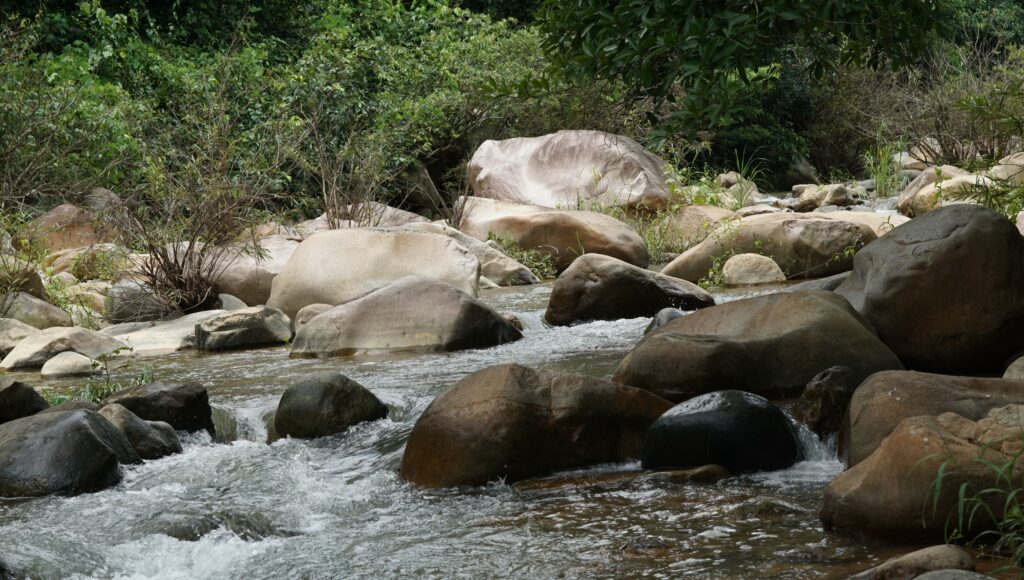
In order to unleash the potentials of natural and cultural resources in a sustainable way, the People’s Committee of Huong Hoa district has come up with a comprehensive plan on community-based tourism. Part of the plan is dedicated to turning local waterfalls into established tourism site.
As a long-standing partner of Quang Tri province and Huong Hoa district in particular, MCNV is joining the local authority in this initiative. The first step is turning Chenh Venh waterfall into an established tourism site and is implemented as part of the project “Promoting sustainable partnership between CSOs and enterprises for sustainable forest management in the context of climate change” (PROSPER), co- funded by the European Union.
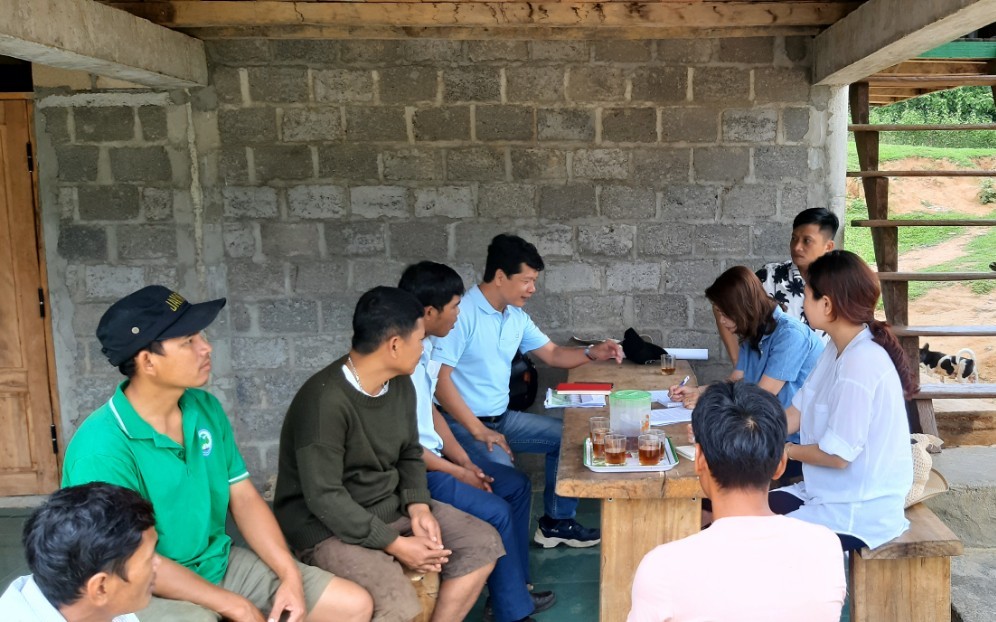
Currently, key infrastructure at Chenh Venh waterfall site has been completed, including upgrading staircases, installing information board, protective barriers, hazard signs, dust bins and building bamboo huts for tourists.
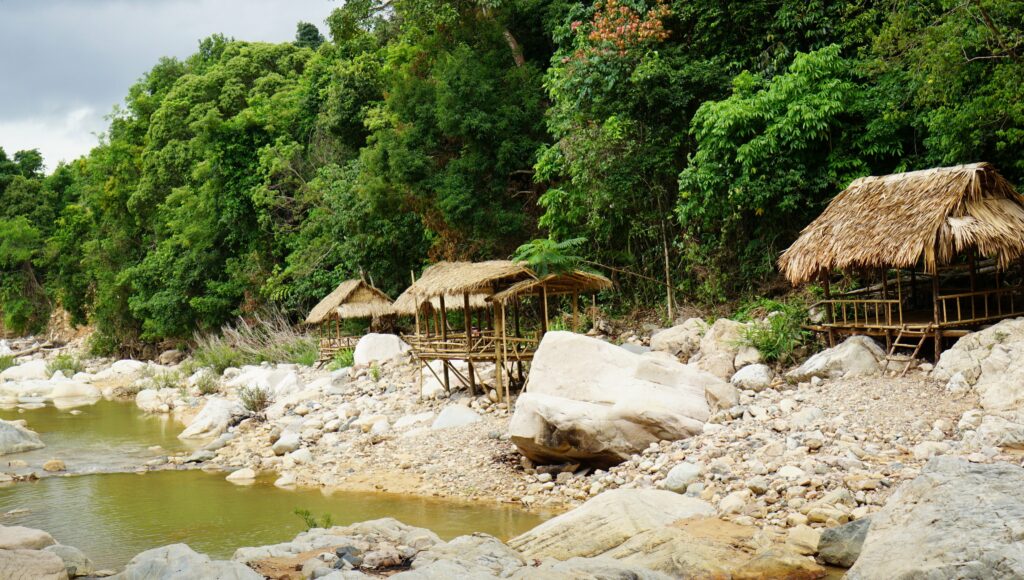
At the same time, a group of on-site tourism staff is established, with the majority recruited from the village’s forest protection team and the residents living close to the waterfall. The staff is tasked with collecting entrance fees, providing huts renting services, maintaining safety and sanitation at the site. Along with first aid packages and personal floatation devices, the staff has been equipped with basic first aid skills, thanks to a course joinly conducted by MCNV and local health centers.
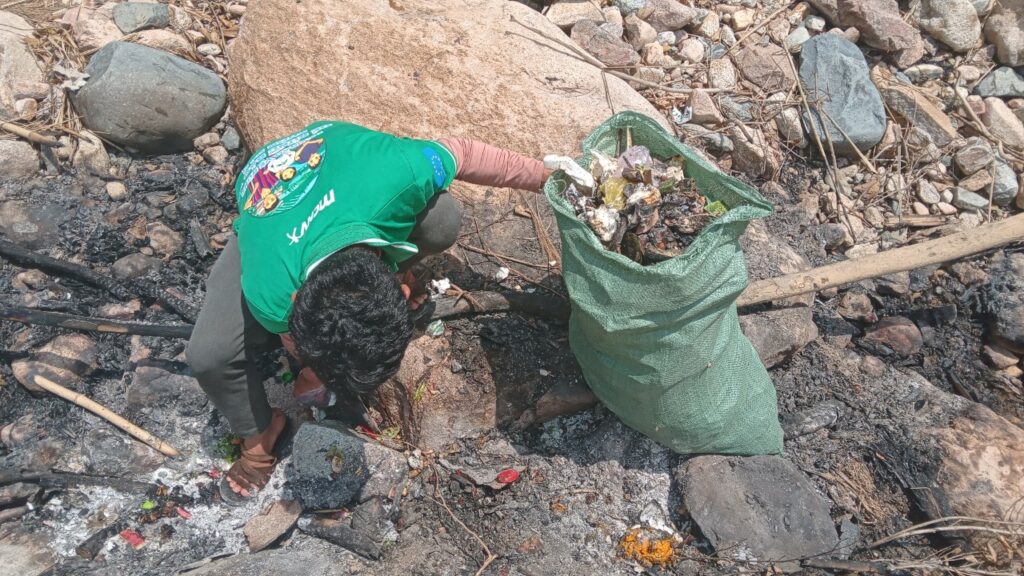
According to the management board of Chenh Venh waterfall site, during the recent national public holidays (from April 28th to May 1st), the total proceedings collected from entrance fees (VND 10,000/1 person) and hut renting fees (VND 120,000/hut) was VND 4 million – a relatively large amount to a remote mountainous village like Chenh Venh. Half of the proceeding was paid as wage for the staff, while the rest went toward Chenh Venh village’s Forest Protection Fund.
In the time to come, food and beverage stalls will be set up at the site to provide tourists with the fresh taste of local specialties. At the moment, MCNV is working on preparing the staff with requisite skills in tourism services, such as reception, tour guiding, food hygiene and safety, etc.
The initial outcome of Chenh Venh waterfall site transformation signals a promising future of a bigger project titled “Developing Chenh Venh ecotourism village” jointly implemented by MCNV and Huong Hoa district. The project is implemented based on the advantages possessed by Chenh Venh village in terms of climate, natural landscape, agriculture and geographical position.

Located on the Ho Chi Minh trail which connects Quang Tri with the world-heritage Phong Nha-Ke Bang cave, Chenh Venh village is where the authentic cultural identies of Van Kieu-Pa Co ethicity are well preserved, with tradional occupations like bamboo rattan handicraft, brocade weaving, straw liquor making.
With the sponsorship worths VND 650 million (~EUR 25,000) from MCNV, the project is implemented in the second half of 2021. From July to the end of year, MCNV will work together with local authorities, technical consultants and local residents to complete requisite features of a tourism village, including: rebuilding Bru-Van Kieu ethnic stilt-house, setting up specialties pavillion, constructing clean water system, upgrading vegetables, flowers gardens and livestocks shelters; renovating pavements, roads; etc.
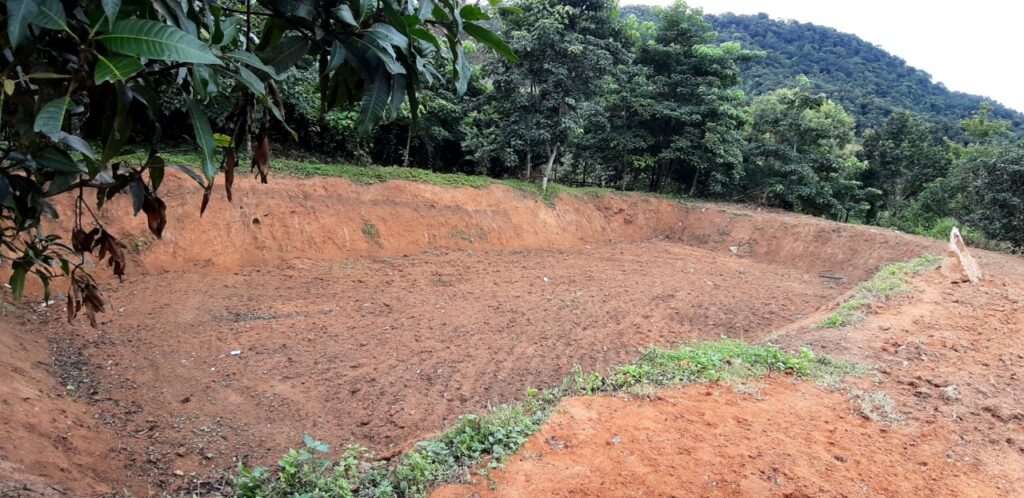
In addition to natural landscapes, Huong Hoa district is famous for numerous tourist attractions including Khe Sanh Victory Monument, Ta Con Airport, Sa Mu pass, etc. In 2019, the number of overseas visitors to Huong Hoa district was estimated at 14,000. Currently, due to the complication of COVID-19, the tourism industry in Vietnam and the world is temporarily ‘frozen’. In the future, when the pandemic is well controled, Chenh Venh ecotourism village is expected to contribute to the recovery of tourism in Central region in particular and Vietnam in general./.
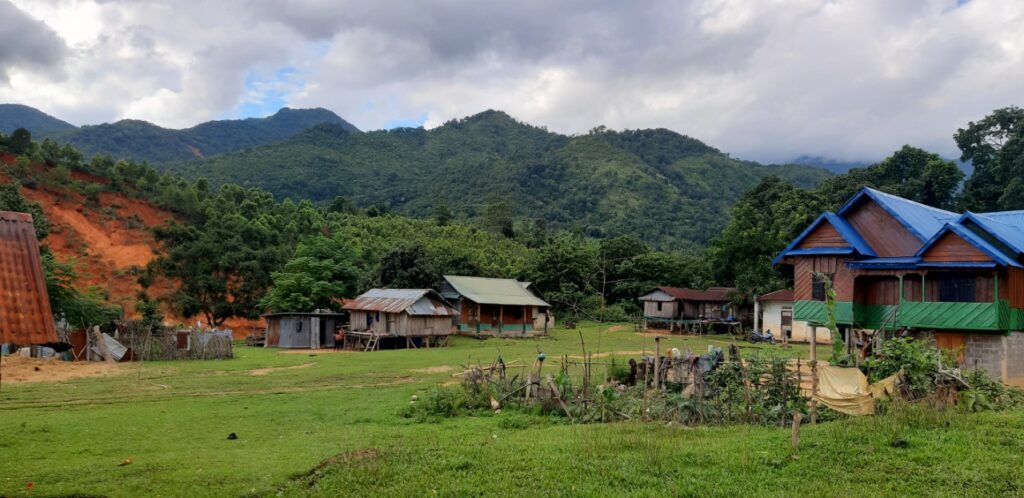
Microfinance – an escape from poverty
Ms. Nguyễn Thị Phương Thảo has always been a good mother who has sought to do the best for her family. However, the unstable income from seasonal work meant that she and her husband could never earn enough money to ensure a good life for themselves and their children. There seemed to be no easy path to escape from this poverty trap.
A turning point in her life arrived in 2017 when she joined the Vinh Tan Hamlet Microfinance Group (Vang Quoi Dong commune, Binh Dai district) which is supported by MCNV’s micro-finance project in Ben Tre Province.
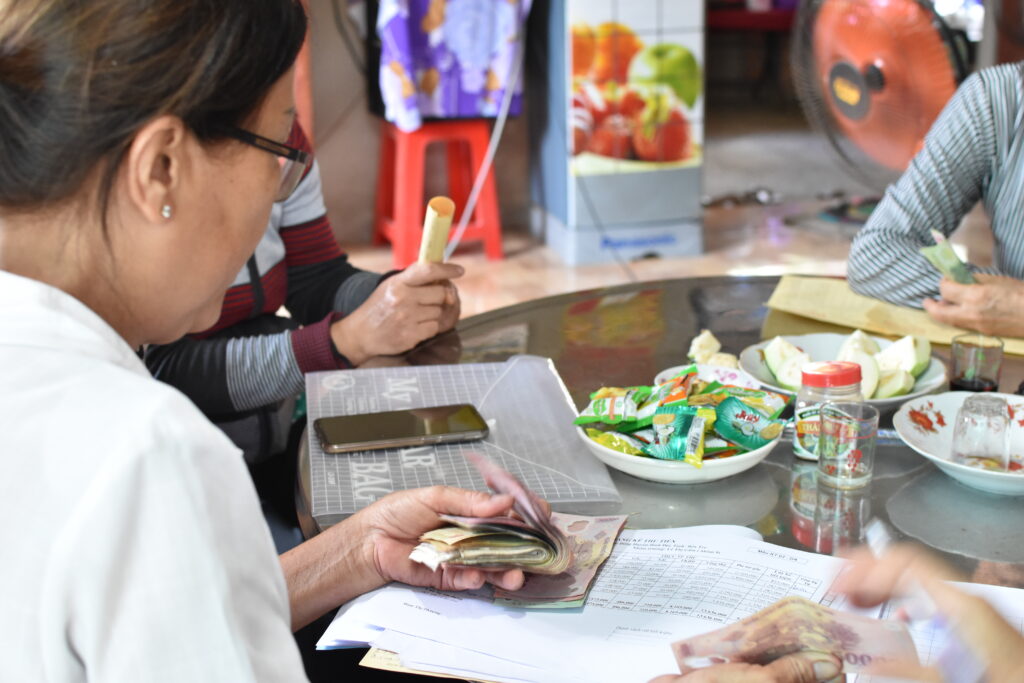
An initial 5,000,000VND loan from this project enabled her to rear pigs to provide a more stable source of income. The initial success of this loan inspired Thao to encourage seven other women to participate in the project. They acquired further small loans to invest in livestock rearing and to build containers to ensure the supply of water during periods of severe drought.
In addition to rearing pigs and cows, this group of women also purchased sewing machines to provide additional income from garment production. This garment processing activity has been vital during the COVID-19 pandemic, as it has enabled the women to work safely from home whilst still earning an income.
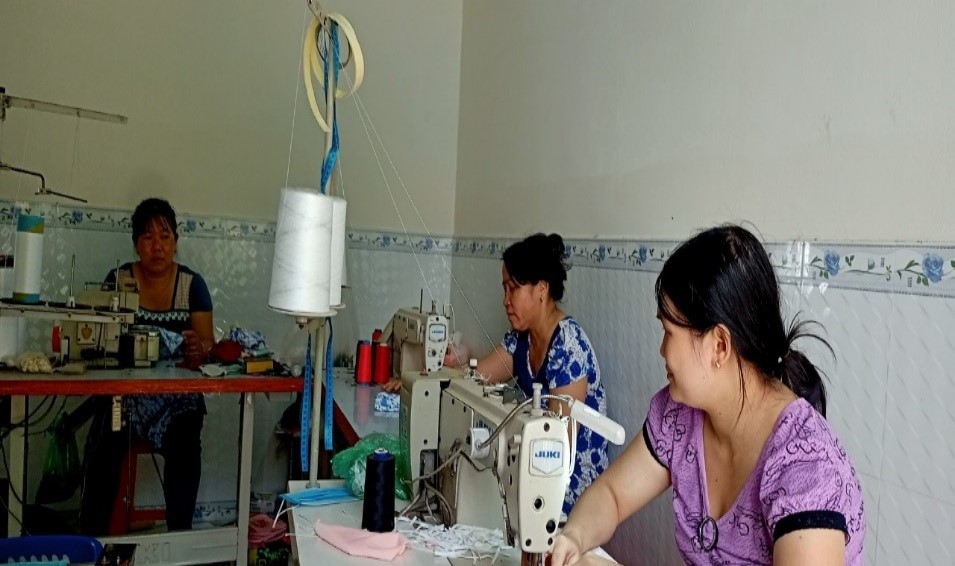
Thao is the leader of this group, and during the COVID-19 pandemic, she has managed to connect the group with a garment company to ensure they have continued to earn an income. Thao has also helped the group to comply with COVID-19 regulations to protect themselves and their communities. Thao’s microcredit group have now saved enough money to purchase several new sewing machines. Her dedication and success, together with MCNV’s support, has enabled the women in her group to earn decent incomes that are resilient to shocks such as COVID-19 and drought. This success has provided a pathway out of poverty and greater prosperity for themselves and their loved ones./.
- The Micro Credit and Saving project in Binh Dai district was launched by MCNV and sponsors in 2009.
- In 2020, the project has been expanded to 11 communes and townships, including Binh Dai township, thanks to the funding of Microcredit for Mothers (MfM) foundation.
- The project has been expanded to 11 communes and townships, providing financial services and facilitate socio-economic inclusion for over 5,000 disadvantaged and poor women, supporting household economy development, response to saltwater intrusion and new rural development.
- Nowadays, the project has become financially self-sustained, and is being conducted with the permission of the State Bank of Vietnam, Ben Tre provincial branch.
Home-based job benefits poor women in Ben Tre
Strong, durable, and reusable, tote bag is becoming a popular choice of shoppers nowadays. Day by day, those eco-friendly products are being produced by diligent home-based worker like Ms. Vo Thi Ngoc Trinh (Binh Dai district, Ben Tre province).
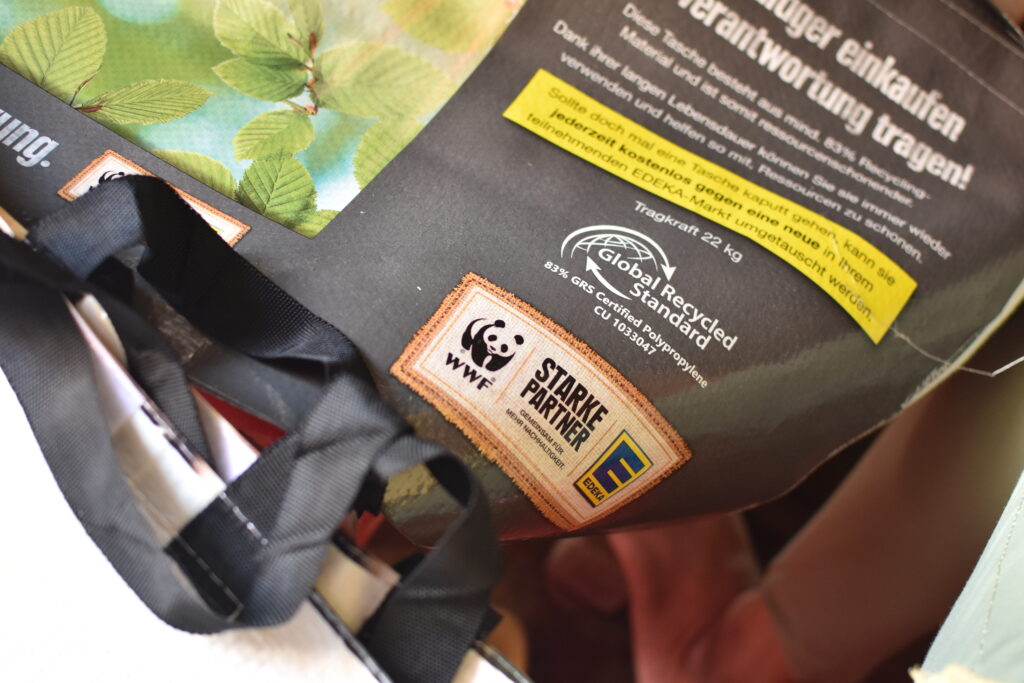
Ms.Trinh is a resident of Loc Thanh hamlet, Loc Thuan commune. She is married and has a 7-year-old daughter. Trinh’s husband is a mason, who often travel far from home to work. For a woman who has to balance between her income-earning activities alongside childcare and domestic responsibilities like Trinh, a home-based job is the most suitable choice.
“As a member of a local Microcredit group, I got access to a loan worth VND 7 million (~EUR 270) to purchase a sewing machine. Thank to it, I started working from home as a tote bags maker since 2020”, Trinh said, while putting together pieces of cloth and carefully stiches.
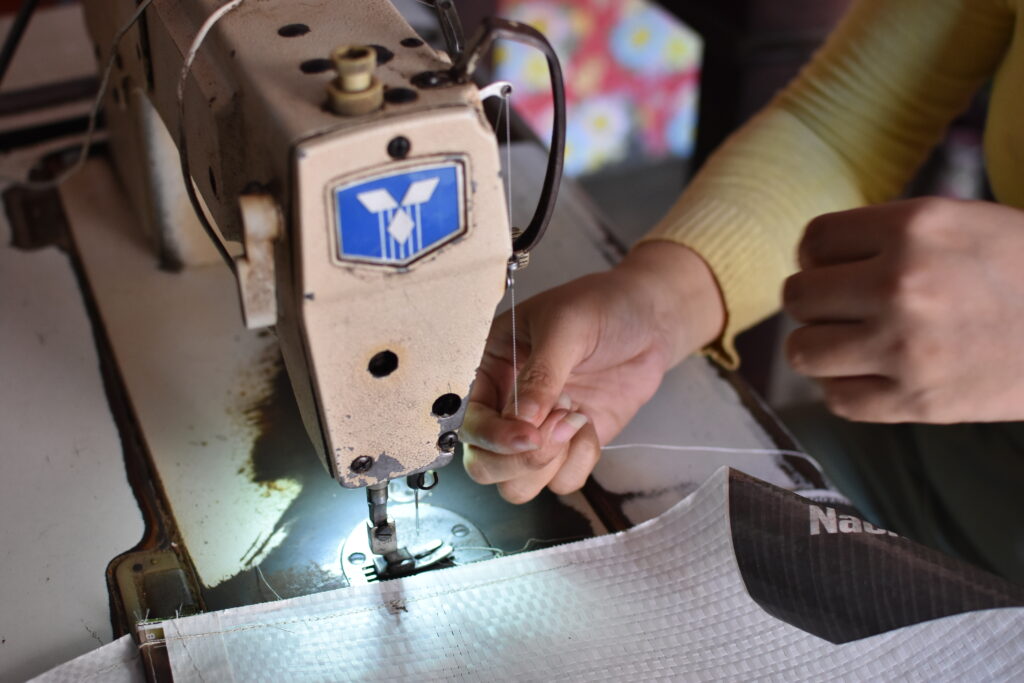
Trinh has been outsourced by a local factory through an intermediary. Every week, the intermediary visits her one to two times, to collect the finished products and supply extra materials. The money Trinh earned depends on the quantity of products she completes.
“On average, I make around VND 80,000 – 100,000 each day (VND 2.4 million to 3 million per month).
“Working from home allows me to earn some money while still can manage to do chores and take my daughter to school”, said Trinh.
“The income earned by my husband and me is just enough for us make end meets. My daughter is at grade one of primary school now, hence the expense has increased, as we have to pay for tuition fee, textbook and stationery, etc.”
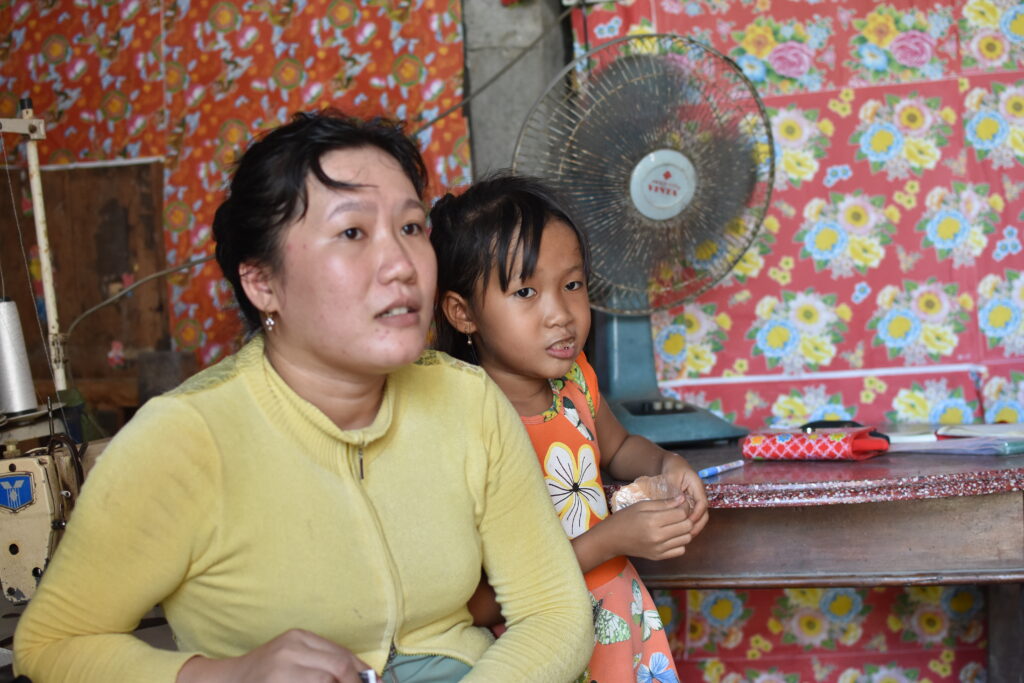
“I don’t think we will have more kids, as I’m afraid that we cannot afford to raise them”, Trinh said.
“At the moment, my husband and I just want to save enough money to renovate this house, especially the kitchen, it is too shanty”, she said./.

- The Micro Credit and Saving project in Binh Dai district was launched by MCNV and sponsors in 2009.
- In 2020, the project has been expanded to 11 communes and townships, including Binh Dai township, thanks to the funding of Microcredit for Mothers (MfM) foundation.
- The project has been expanded to 11 communes and townships, providing financial services and facilitate socio-economic inclusion for over 5,000 disadvantaged and poor women, supporting household economy development, response to saltwater intrusion and new rural development.
- Nowadays, the project has become financially self-sustained, and is being conducted with the permission of the State Bank of Vietnam, Ben Tre provincial branch.
Zoom in on a life-changing project in Binh Dai (Ben Tre province)
In over the last 10 years, in Binh Dai District, Ben Tre Province, there is a project that has been providing life-changing instrument for thousands of women to rise against poverty…
From poverty to financial independence
In the past, Ms. Truong Thi Phuong (born in 1972) and her husband, residents of Phu Thanh Hamlet, Phu Vang Commune, Binh Dai District, Ben Tre province used to made a living out of a small vegetables garden and some seasonal jobs, which generated a modest amount of income.
Despite being diligent, they still struggled to make ends meet. When their children got into college, the couple were over the moon but also extremely worried. The kids would have a brighter future than their parents but how could they manage to pay for their four-year tuition fees and other expenses in the city.
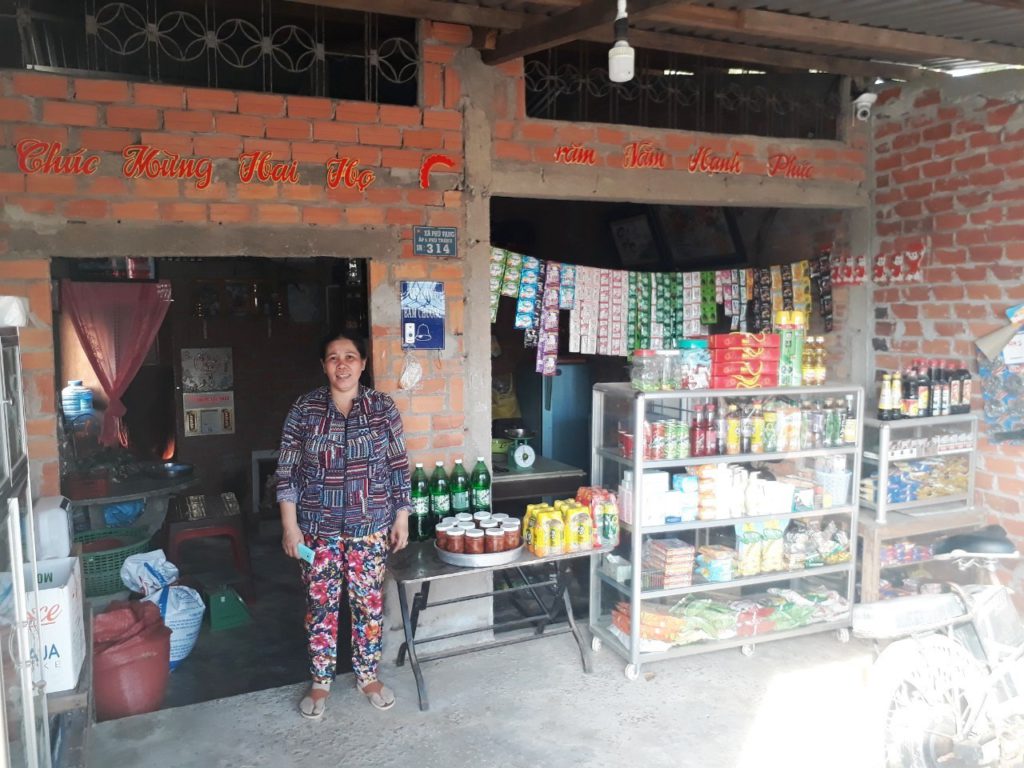
Ms.Truong Thi Phuong and her grocery store.
Phuong’s family life came to a turning point in 2015, when she became member of the Women Union of Phu Vang Commune and began to get accesss to the Micro Credit and Saving project, implemented by the Medical Committee Netherlands-Vietnam (MCNV) and sponsors.
With the loan provided by the project, Phuong and her husband shortly sleeved up to find their ways out of poverty. Part of the cash was spent on poultry rearing, while the rest was invested in launching a small grocery store.
“At the beginning, due to my lack of experiences, we faced a lot of challenges”, Phuong recalled.
Fortunately, thanks to active participation in science and technology transfer workshops held by local Women Union, Phuong and her husband soon acquired fundamental knowledges in farming as well as doing business. Step by step, their ‘startup’ started to yield profits, providing a stable source of income, and at the same time, could be used as capital to feed new investment.
After several microcredit cycles, following the advices of project staff and the senior members of local Women Union, Phuong bought a cow which later gave birth to two calves. After deducting all costs of rearing, they earned around VND tens million annually.
Since the rearing was not time-consuming, Phuong’s husband spent the rest of his day on some part-time jobs such as bricklaying, fishing, which earned him VND few hundred thousand per day.
After 5 years of participating in the Micro Credit and Saving project of Binh Dai district, Ms. Truong Thi Phuong and her husband have filed for crossing their name in the poor households list.
From the bottom where the couple could not make ends meet, now they have secured stable and sufficient income. As the two children have graduated from colleges and have found jobs, the family is free from worries about livelihoods. Their old wobbly house has been renovated into a fully furnished one.
Phuong also has more time for community activities. She is very enthusiastic about sharing her experience in doing business with her neighbors, fellows, and lending supports to those in need.
“‘A stitch in time saves nine’, more than anyone, I understand what it is like to live in poverty. At the moment, I am willing to help anyone in need”, she said.
Striving from the bottom, she is always grateful for what the Micro Credit and Saving project and her fellows have done to support her.
Freshwater security against salinity
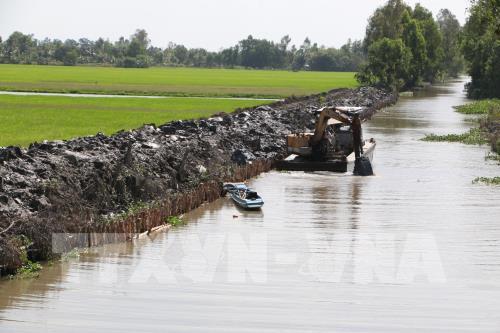
Ben Tre is severely affected by saline intrusion. Illustration photo: VNA
Located in the Mekong delta region, Ben Tre is severely affected by saline intrusion. Even local water plants are affected with salinity of 2 grammes.
Located on an islet, Binh Dai district’s four sides were surrounded by rivers and seas, making the area more vulnerable to saline intrusion (high salinity, deep intrusion level). Local residents are facing huge challenges as saline intrusion negatively affected agricultural production and daily life.
In the fierce battle against salinity, Binh Dai district was lucky enough to receive aid from the Micro Credit and Saving project. Along with providing loans to support livelihoods, the project has also assisted poor, nearly poor, and disadvantaged households to build water containers and purchase rainwater and freshwater storing tanks for daily life and production.

Ms.Nguyen Thi Kim Oanh and her water container.
“In 2016, I registered for a loan of VND five million to build two 4m3 water containers; the costs for materials and workers was around VND six million …” , said Ms. Nguyen Thi Kim Oanh (Tan Long hamlet, Thanh Phuoc commune).
According to Oanh, thanks to the project, her family could store enough freshwater to use for the whole year. In the dry season, the family consume more well water therefore they always have extra stock of rainwater.
Being aware of the benefit in the long run, in 2018, Oanh continued to take a new loan of VND five million to build two 6m3 water containers, the two cost around VND seven million.
Ms. Nguyen Thi Phuong Thao (born in 1985) lives in Vinh Tan hamlet, Vang Quoi Dong commune is another beneficiary of the project. Thank to the 6m3 rainwater, freshwater container, her three-member family now can feel secured during drought season.
“Because saline intrusion occurs every year, I decided to build container to store rainwater or freshwater for daily use. In 2016, I filed for a VND five million in 24 months to build two containers. I was thrilled as they were so helpful. Without them, we would have had to use saltwater like the previous years, which negatively affects sanitation. I am going to borrow some more to build another two containers. If salinization persists, I am afraid that there will not be enough freshwater…”
- The Micro Credit and Saving project in Binh Dai district was launched by MCNV and sponsors in 2009.
- The project has been expanded to 11 communes and townships, providing financial services and facilitate socio-economic inclusion for over 5,000 disadvantaged and poor women, supporting household economy development, response to saltwater intrusion and new rural development.
- The project has so far provided 954 households with loan to construct their own water containers. From the beginning of the year, 149 households have received the supports, leading to more registration for loan.
- Nowadays, the project has become financially self-sustained, and is being conducted with the permission of the State Bank of Vietnam, Ben Tre provincial branch.
Collaboration And Networking To Enhance Education and Nutrition (CANTEEN)
Background
Improvement on nutrition and food security continues to be MCNV’s work priorities in Laos and especially in the areas where more ethnic minority groups are living. Nutrition and food security are closely interlinked and requires multi-sectoral approach as per the 8th National Social Economic Development Plan by the Government of Lao PDR, which states: “Nutrition is one of the sectors that faces challenges in the implementation since it is associated with several sectors such as food security, food access and food consumption. To counter these, it requires effective collaboration and shared responsibilities among the concerned agencies including sector of health, education, agriculture, environment, industry and commerce, etc.[1]”.
MCNV’s response
In Lao PDR, MCNV has recently started CANTEEN programe (Collaboration And Networking To Enhance Education and Nutrition). This is a 4.5 year-program (between Jan 2017 – June 2021), which is funded with 75% budget contribution by the EU delegation to strengthen the capacity of Civil Society Organisations (CSOs) and Local Authorities (LAs) to work in partnership towards the achievement of development goals. The programme has two specific objectives as follows:
- To build the capabilities of at least 6 LAs, 1 non-profit association (NPA) and 20 village development committees (VDCs) to work together to deliver nutrition sensitive services that improve food security, nutrition, and overall well-being of more than 6,000 poor ethnic minority people in 20 remote upland villages in Nong District, Savannakhet province.
- To strengthen capacity in policy dialogue and promote participation, transparency and accountability in multi-sector partnerships to encourage the uptake of successful models and to increase involvement of CSOs in development processes.
CANTEEN works closely with CODA (a Lao NPA – non for profit association) and Provincial Health Department of Savannakhet province to promote collective and coordinative working among different local authority organisations and community based organization in Nong district to work together for improvement in nutrition and food security at village and district levels. The experience and lesson learnt from such multisectoral coordination will contribute to and be shared with other stakeholders at provincial and national levels who are working together to improve the situation of nutrition and food security in Lao PDR.
Expected results
During its 4.5 years implementation, CANTEEN program will support a range of activities in order to achieve the following expected results:
Expected result 1.1: Strengthened capacities of the participating LAs, CSOs and CBOs to deliver relevant, effective nutrition services to marginalised and vulnerable people, in particular women and children: This focuses on strengthening capacities of participating CSO and LA organisations and their staffs and members. The specific paths for capacity-building will be designed based on analysis of current gaps and future needs of each participating organisation. For the 20 participating Village Development Committees (CBOs) the Action will use a small-grant support scheme to help them improve their skills by practicing a full cycle of small experimental projects.
Expected result 1.2: Reduced malnutrition and food insecurity in target villages through adoption of convergent approaches that include key stakeholders in health, agricultural and education sectors: This is designed specifically to demonstrate effectiveness of the convergent approach in reducing the incidences of malnutrition and food insecurity in the selected villages. This emphasises the importance of working together to achieve a common goal. All sectoral interventions (i.e. educational, agricultural or health) are designed for nutrition sensitivity and are aimed at generating evidence on how to contribute to reduction of food insecurity and malnutrition. The proposed interventions under this refer to 14 of the 22 priority actions identified in the recently published National Nutrition Strategy to 2025 and Plan of Action 2016- 2020, designed to reduce malnutrition rapidly and sustainably with an emphasis on gender equality and the rights of women and girls.
Expected result 2.1: Increased effectiveness of institutional environment for CSOs and LA, with stronger networks that have better capacity to advocate for sustainable approaches using evidence arising from the action. This will show the up-scaled and sustainable interventions in Nong District, using evidence-based advocacy to argue for their replication, adaptation and adoption in other areas of Lao PDR. It will strengthen links with civil society networks such as the Scaling Up Nutrition (SUN)-Alliance. This adds value to GoL’s plans, as it currently is expanding the rollout of convergent approaches to other provinces, including Savannakhet, and will be seeking evidence and support for effective implementation and expansion.
[1] The Five Year National Social Economic Development Plan VIII – 2016 – 2020: part I: 7th NSEDP 2011-2015: achievement and lessons learned. Lao PDR.
Nutrition sensitive agriculture in Lao PDR and Vietnam
Background
Despite significant development progress in recent years, hunger remains a significant problem in Lao PDR, with 44% of children under 5 years old being malnourished placing their lives at risk and damaging their lifelong health. This issue is particularly severe in Nong District, one of the poorest areas in Lao PDR, and where the people can suffer food shortages for many months in the year. To tackle these problems MCNV takes a nutrition-sensitive approach to its agricultural and livelihoods work within some of poorest villages in the district.
MCNV’s responses
This approach seeks to maximize agricultures contribution to nutrition and recognizes the multiple benefits derived from enjoying a varied and nutritious diet, the social significance of food and the importance of agriculture in supporting rural livelihoods. Instead of focusing exclusively on crop production for the market, villagers use their land to cultivate a variety of commodities including fruits, vegetables, small livestock and fish. In Nong, MCNV has supported this approach by supporting the development of fish ponds, providing seeds and equipment for home gardens and strengthening village veterinary services to ensure healthy livestock. MCNV’s approach to agriculture also entails promoting gender equity, and providing nutrition education so that household resources are used to improve nutrition, especially that of women and young children. For example, the approach looks at the division of labour between men and women, to ensure mothers have enough time to breastfeed their infants. Finally, MCNV adopts a multi-sectoral approach to nutrition linking agriculture to sectors that address other causes of malnutrition, namely education, health and social protection.
Achievements
Through working in partnership with organisations ranging from village development committees to the Ministries of Agriculture, MCNV has improved agricultural production whilst preserving the soil, land and water that villagers depend upon, but most importantly it has helped to reduce hunger and malnutrition improving the health of children with lifelong benefits.
Future direction
In the coming years MCNV is working with the Food and Business Knowledge Platform and VU University in the Netherlands to conduct research into the impacts of nutrition-sensitive agriculture to ensure that it can be scaled-up so many more people in Lao PDR and elsewhere can benefit from this approach.
http://knowledge4food.net/research-project/scaling-up-nutrition-sensitive-agricultural-initiatives-in-vietman-and-laos/
Climate change adaptive agriculture & livelihoods
Background
Southeast Asia is one of the regions that will soon be severely affected by climate change. All throughout the region farmers are complaining that the rainy seasons have become more unpredictable and often bring too little rain too late, leading to misharvests.
The combined effect of less freshwater runoff from the Mekong river, due to upstream dams, and rising sea water levels is already leading to increased salinization. In Ben Tre province where MCNV has been working for many years this has become an acute problem for many as the famous Pomelo trees have started to wither away.
MCNV’s responses
Climate change will eventually affect all, but the poor and marginalized are hit hardest and soonest. Therefore MCNV pays special attention to help pilot and promote more climate change resilient forms of agriculture in the areas where we work. Sustainable approaches that stop and revert the deterioration of soil fertility and conserve the use of fresh water are among the most important directions. As long as these methods do not require heavy investments which would per definition ‘exclude’ the poor people to benefit from. At the same time, to stabilise the lives of the poor who are seriously affected by drought and salinity, MCNV offers technical trainings and credit for poor women to start up on alternative income generation activities such as on husbandry and handy craft work. Establishment of new cooperative models for poor women based on their traditional professional strengths and market experience is a new approach that MCNV pilots in Ben Tre province. The cooperatives promises to create more opportunities for the poor because it reduce production cost and more effective in labour utilisation.
MCNV has responded quickly and effectively with an initiative to support the poor women to build big water container to retain rain water for their cooking needs in dry season right after the drought and salinity happened in early 2016. Up to September 2016, the revolving loans for water container building has been helping 160 household to build 296 containers which could retain total of 829m3 rain water for live needs in drought seasons. The number of poor households which could build containers will increase in coming year as the loans revolves.
The theme of sustainable agriculture is deeply intertwined with the increasing need of producing safe and nutritious food for growing populations. The massively increasing concern about food safety among the more affluent people in urban areas in Vietnam in fact offers new livelihood chances for poor ethnic minority farmers in organic farming. Their land and soils, if kept healthy and unpolluted, may in future become one of their most valuable assets. Luckily there are signs that the agriculture policy makers might turn away from the customary equation of high technology and large scale solutions with ‘development’, where these are still strongly promoted by global agribusiness and agro-chemical corporations.
MCNV is most strongly developing the theme of ‘Nutrition-Sensitive Agriculture’ among some of the most remote and poor ethnic minority farmers in Laos. These areas are too far from urbanized areas and markets and the emphasis must be on sustainable self-subsistence and improving/ restoring the access to nutritious foods, especially for infants and pregnant women, in a context of deteriorating natural resources /forests.


